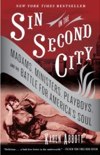Sin in the Second City
An entertaining account of a famous Chicago brothel, the Everleigh Club, which flourished in the early twentieth century and which was ultimately closed by growing opposition to prostitution and concern over White Slavery. Abbot is chiefly concerned with the proprietors of the Everleigh, Ada and Minna Everleigh (born Simms), and their relations with their rivals, their employees, with Chicago's colorful political machinery.
The whole White Slavery question strikes us today as a strange mix of naïveté and hypocrisy, mixed with prudery and class friction. This is, pretty much, Abbott’s diagnosis, and because she has little real sympathy with the reformers, nearly half of her book is devoted to preachers and reformers she clearly views as colorless and dull. I think more could be done with this material.
- Why, exactly, did white slaves feel enslaved? This was Chicago, not Corleone or Eiseshok; if you slept with your boyfriend in the village then maybe you'd be discovered and cast out, but Chicago could keep a secret. The White Slave agitation comes a mere ten years before the flappers.
- Was there a White Slavery conspiracy at all? It seems to me that this was the birth of the notion of Organized Crime, of a great industrial trust that managed petty crime throughout the nation and, indeed, the world. To what extent was this real and accurate concept? Or was it a myth fostered by governments and lawyers and churches to extend their power?
- It is interesting, for example, to look at the Everleigh sisters, with their managerial acumen, their fluency with all classes and ethnicities, and their deep disinterest in men, with Jane Addams and her colleagues. Hull House (800 S Halsted) was, after all, a short walk from the Everleigh at 2231 S Dearborn.
So, opportunities were missed here. But it’s still a hell of a good yarn.
